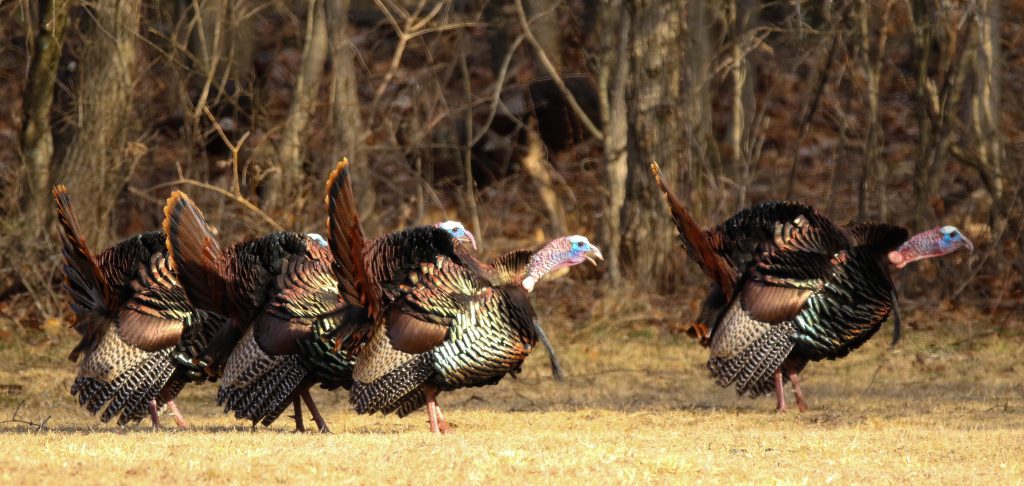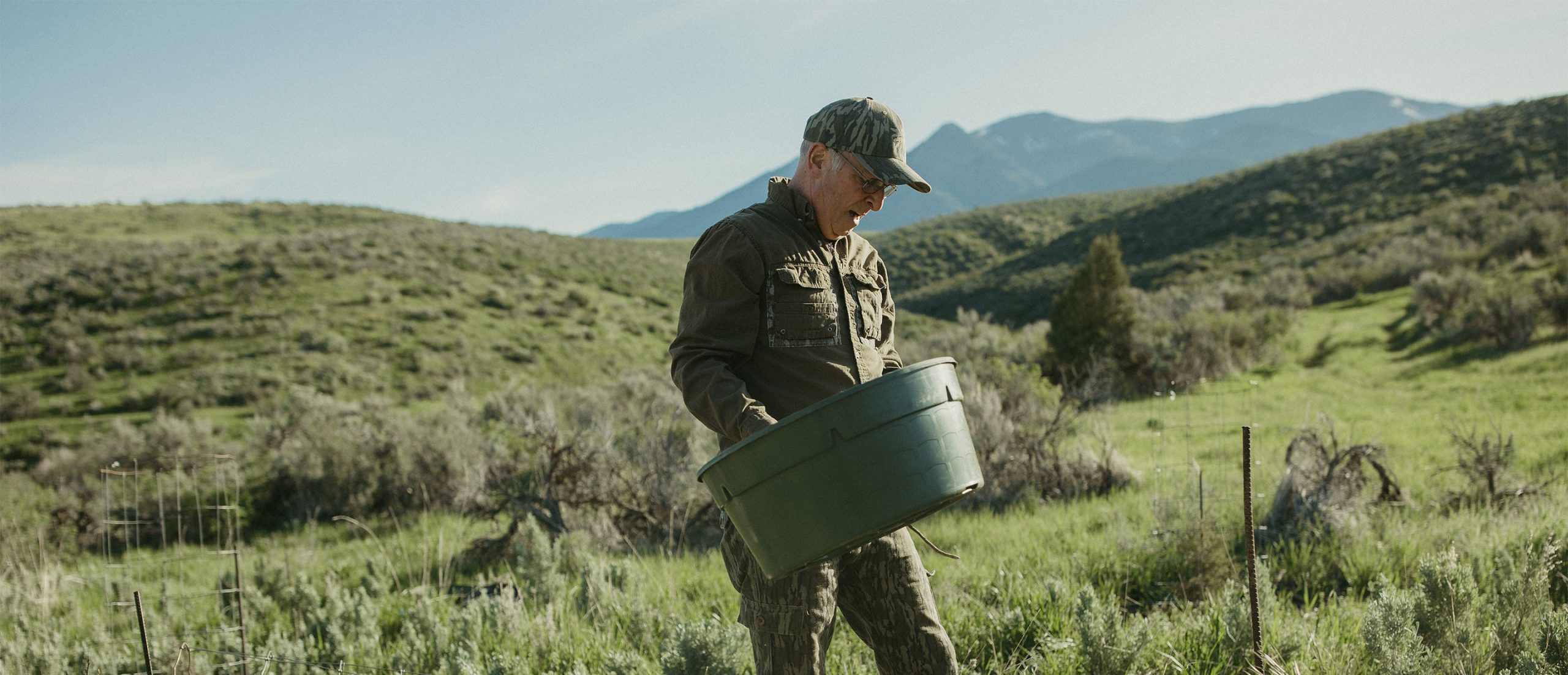Grassroots Conservation at a Landscape Level
NWTF state chapters go beyond the call of duty.
The wild turkey decline isn’t limited to the boundaries of a state; it is a complex issue that is happening on a larger scale. Likewise, other conservation issues don’t end where a new state begins – forests, waterways and wildlife corridors encompass multiple state boundaries, as do the associated challenges with managing them.
From North Dakota to Georgia, NWTF state chapters are stepping up to the challenges of the day and funding projects beyond their state boundaries, a new and innovative approach for NWTF chapters.
For those unfamiliar, the NWTF is comprised of state and local chapters in all 49 states that the wild turkey inhabits. These chapters are led by dedicated volunteers who care deeply about the organization’s mission to conserve the wild turkey and preserve North America’s hunting heritage. When they are not raising funds for conservation, they are often in the woods mentoring a new hunter or planning an event to help someone get their first harvest.
Over the decades, these volunteers have provided critical financial support for conservation projects through the Hunting Heritage Super Fund, a funding model – created in the late 1970s – where volunteers across the country raise money at banquets and other types of fundraisers and then allocate a significant portion of those funds back into meaningful conservation and outreach projects.
Traditionally, these funds were allotted in the state where they were raised. However, in the last few years, chapters are increasingly applying Super Fund dollars to conservation beyond state lines.
“Our volunteer leaders are thinking about conservation beyond just their state borders,” said NWTF co-CEO Kurt Dyroff. “Whether it is projects to increase the wild turkey population or ensuring the areas where we hunt, fish and recreate are around for future generations, we applaud our state chapters that are stepping up and addressing challenges on a landscape scale. We commend these efforts, and they do not go unnoticed.”
The phenomenon of state chapters funding projects beyond state lines is relatively new. In the summer of 2022, the NWTF Indiana State Chapter broke new ground by supporting wild turkey research on behalf of the Tennessee State Chapter, paying $25,000 to cover research expenses after the Tennessee State Chapter already allocated its funding for the year.
"Money raised from fundraising events is not state-specific," said Patt McFadden, NWTF Indiana State Chapter president. "The money raised is for our mission, the conservation of the wild turkey and the preservation of our hunting heritage. Working across state boundaries with like-minded volunteers, like Mark [Mark Darnell is the Tennessee State Chapter president], solidifies my excitement to continue to do what I can for the NWTF and our beloved wild turkey.”

Since then, numerous states have funded wild turkey research beyond their state lines through the NWTF’s National Research Request for Proposals program, including significant investments from the Kansas, Nebraska, South Carolina and Alabama state chapters.
NWTF chapters are now taking the same unbounded approach to the NWTF’s landscape-scale initiatives. For instance, the Alabama NWTF State Chapter recently allocated $50,000 for use across the 18-state region of the NWTF’s new Habitat for the Hatch initiative. The initiative was created to tackle the wild turkey decline felt across the Southeast by creating essential nesting and brood-rearing habitat on a landscape scale.
“The wild turkey decline doesn’t just affect us in Alabama; it affects all as turkey hunters and turkey enthusiasts,” said Scott Brandon, Alabama NWTF State Chapter president. “Through Habitat for the Hatch, we will put the habitat wild turkeys need on the ground to successfully recruit broods year after year in Alabama and across the Southeast. We are proud to invest in this new initiative.”
The Georgia NWTF State Chapter also provided $10,000 to the Habitat for the Hatch initiative for its 2024 funding.
Likewise, the Oklahoma NWTF State Chapter contributed $16,000 in 2022 to be used across the NWTF’s Waterways for Wildlife initiative’s 10-state region. The NWTF created Waterways for Wildlife to address urgent conservation needs in ecosystems situated mainly along creeks, streams and rivers across the American West and Great Plains. Wild turkeys and various wildlife species depend upon these ecosystems for water, food, cover, roosting, nesting and travel corridors. The Oklahoma State Chapter followed up its commitment to the initiative with a $10,000 investment in 2023 and another $10,000 contribution in 2024.
Additional chapters have provided funds for Waterways for Wildlife over multiple years, including the Texas NWTF State Chapter’s $25,000 contribution, $25,000 from the Kansas state chapter, $18,000 from Nebraska, $10,000 from North Dakota and $5,000 from South Dakota.
The chapters’ investments were leveraged to a total $8.1 million dollars with initiative’s partner funds over two years, currently enhancing over 100 stream miles and over 10,000 acres of critical wetland habitat through 34 projects.
In addition to Habitat for the Hatch and Waterways for Wildlife, the NWTF has spearheaded additional regionally based initiatives – including the Big Sky Forestry Initiative and the Rocky Mountain Restoration Initiative – to address other conservation challenges areas of our country face.
The NWTF’s initiative-model for conservation delivery allows the organization to stay true to its mission while expanding opportunities for collaboration with traditional and non-traditional partners through the NWTF’s Four Shared Values, ultimately increasing the impact of wild turkey conservation and hunting heritage efforts.
For example, the NWTF’s partnership with the USDA Forest Service to help reduce the risk of catastrophic wildfires both increases wild turkey habitat and prevents hunters from being locked out of public lands due to wildfire.
NWTF State Chapters are seeing the benefits of the initiative-model of conservation at a landscape scale and are taking action.
“From habitat enhancement projects at their local WMAs to addressing the larger conservation obstacles that occur across state boundaries, our volunteers are adapting their strategies to ensure the NWTF has all the bases covered,” said NWTF co-CEO Jason Burckhalter. “I challenge our volunteer leaders to continue this forward, landscape-level thinking as we focus on aligning national and state goals for the future of this organization and conservation delivery."
| State Chapter | Amount | National Initiative/Priority |
| NWTF Alabama | $50,000 | Habitat for the Hatch |
| NWTF Alabama | $50,000 | Research RFP |
| NWTF Georgia | $10,000 | Habitat for the Hatch |
| NWTF Indiana | $25,000 | Research work in Tenn. |
| NWTF Kansas | $25,000 | Waterways for Wildlife |
| NWTF Nebraska | $18,000 | Waterways for Wildlife |
| NWTF North Dakota | $10,000 | Waterways for Wildlife |
| NWTF Oklahoma | $36,000 | Waterways for Wildlife |
| NWTF South Carolina | $50,000 | Research RFP |
| NWTF South Carolina | $50,000 | Habitat for the Hatch |
| NWTF South Dakota | $5,000 | Waterways for Wildlife |
| NWTF Tennessee | $38,340 | Endowment (Raised Through Event) |
| NWTF Texas | $25,000 | Waterways for Wildlife |
List of current state allocations to national initiatives or priorities as of 10/19/2023
